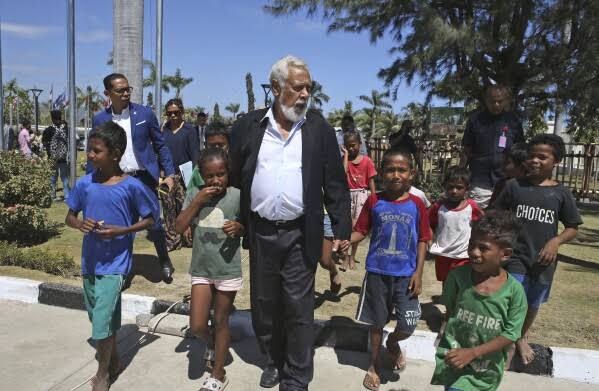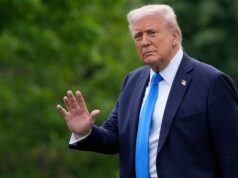East Timor to welcome the pope’s visit after 20 years of fragile stability

East Timor is in a festive mood and likely to welcome the arrival of Pope Francis on his first trip to the deeply Catholic country, hard on the heels of the 25th anniversary of the referendum on independence from Indonesia.
Francis is due to arrive Monday in one of the world’s poorest countries of 1.3 million people, also known as Timor-Leste, following visits to Indonesia and Papua New Guinea. Banners and billboards have filled the streets of the seaside capital, Dili, to welcome the pontiff.
“The pope’s visit is the biggest, the best marketing anyone can aspire to promote the country, to put the country on the tourist map,” East Timor’s President Jose Ramos-Horta said in an interview with The Associated Press on Wednesday.
The 74-year-old former independence fighter and Nobel Peace Prize laureate, who returned to the presidency in 2022, has welcomed the papal visit as, some 98% of Timorese identify as Catholic.
The World Bank in its semi-annual report in February praised East Timor as a peaceful, democratic nation. For more than 10 years, free and fair elections have been held despite tensions between the two largest parties that have occasionally erupted into violence.
The country’s path to statehood has been traumatic.
The Timorese first “declared their independence” from Portugal a Christian country and the colonial ruler, on Nov. 28, 1975, but that move was crushed nine days later when neighbouring Indonesia invaded. As many as 200,000 people were killed during the 24 years of Indonesian rule.
On Aug. 30, 1999, Timorese cast their ballots in a United Nations-backed referendum that backed independence from Indonesia with 78.5% of the vote. Indonesia’s military responded with a scorched-earth campaign that shocked the world. About 1,500 people were killed, more than 300,000 were displaced and over 80% of East Timor’s infrastructure was destroyed.
An international force led by Australia intervened to restore security. After a period of direct U.N. governance, East Timor finally became an independent state on May 20, 2002.
The transition to democracy has been rocky, with leaders battling poverty, unemployment and corruption. East Timor’s economy is heavily dependent on energy resources in the Timor Sea, but according to the U.N. Human Development Index, oil and gas income is falling as reserves are depleted, and the economy is not yet diversified.
About 42% of the population lives below the poverty line, according to the U.N. Development Program. Unemployment is high, job opportunities in the formal sector are generally limited and most people are subsistence farmers with no steady income.
In the health sector, 47% of children still suffer from stunting and for every 1,000 babies born in East Timor, 49 died before their 5th birthday due to malnutrition, according to the U.N.’s Group for Child Mortality Estimation. Nearly all medicines must be imported and supplies sometimes run out. Patients seek more advanced care overseas.
“Achieving national independence and managing the country afterward are not easy tasks,” Koji Sakane, the director of Global Peacebuilding Association of Japan, said in his February study. “In other words, it is not easy for less experienced figures and organizations to provide the people with a stable living environment and gain their trust.”
Out of necessity, Sakane said, the country was run by leaders and organizations who lacked experience in key areas, including coordination between competing political parties and control of ex-combatants and weapons from the struggle for independence.
While poverty levels remain high, East Timor joined the World Trade Organization last month as its 166th member, after 7 1/2 years of negotiations.
It also applied for a full membership in the Association of Southeast Asian Nations. It currently has observer status, and wealthier members of the regional bloc like Singapore had feared it would be a burden and delay the creation of an ASEAN Economic Community.
Both East Timor’s Prime Minister Xanana Gusmao and Ramos-Horta highlighted the importance of joining the 10-nation grouping of more than 700 million people to give foreign companies and investors the confidence and security to invest in the country. Last
In 2023, ASEAN member states adopted a roadmap for East Timor’s full membership. It includes a requirement for East Timor to prepare a special budget to meet its obligations, such as building infrastructure to host ASEAN meetings and accommodate delegates.
As an ASEAN member, the island nation would have to attend 1,300 meetings a year, host summits, and contribute $2.5 million per year to the group’s budget.
“I can assure you that it’s on the right track,” said Milena Maria da Costa Rangel, East Timor’s vice foreign minister for ASEAN affairs, adding that the government is involving the private sector and civil society to meet the criteria in the roadmap.
Ramos-Horta expects that East Timor will become a full member of ASEAN in 2025, under Malaysia’s chairmanship.
However, economic analyst Fernando Dias Gusmao, from the Peace University in Dili, was more downbeat, saying the government has moved slowly to implement the roadmap.
East Timor continues to face challenges in terms of infrastructure, including the airports, accommodations and IT network necessary to host high-level meetings, Gusmao said.
“It was a big wish but the steps to make that wish come true are not yet optimal,” Gusmao said.




